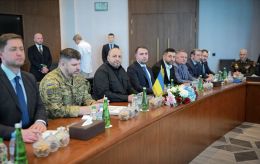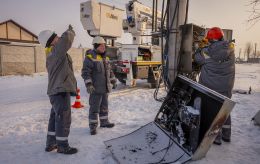Trump's week: Changes for Ukraine after US election and what comes next
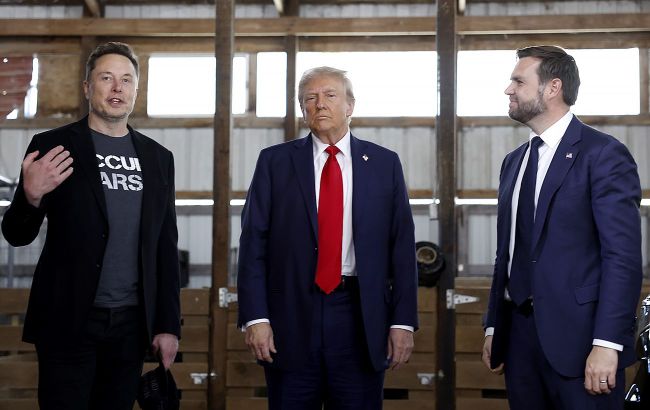 Businessman Elon Musk, Donald Trump and future Vice President J.D. Vance (Getty Images)
Businessman Elon Musk, Donald Trump and future Vice President J.D. Vance (Getty Images)
Donald Trump's victory in the US presidential election is likely to lead to a global political earthquake, which will also be strongly felt in Ukraine. RBC-Ukraine examined what Trump has said and done regarding Ukraine over the past week and what to expect in the future.
Contents
- Personal contact between Zelenskyy and Trump
- Plans for Ukraine and their refutation
- Types of people Trump seeks for his team
- Trump’s inner circle and Ukraine
Almost a week has passed since Trump’s victory in the US presidential election, yet global political tension only seems to be escalating. Media, politicians, and experts worldwide are tracking every leak and hint regarding Trump’s possible stance on various issues in international politics. And the question of Ukraine is, of course, among the most critical.
Personal contact between Zelenskyy and Trump
Although the official selection of the US president won’t happen until early January, this is largely a formality, and most world leaders began congratulating Trump as soon as his victory became apparent. Notably, on Wednesday, November 6, Ukraine’s President Volodymyr Zelenskyy also called Trump.
“It was a productive conversation, a good conversation. Of course, we cannot yet know what his actions will be. But we do hope that America will become stronger,” Zelenskyy said on November 7 at the European Political Community summit in Budapest.
The conversation lasted about half an hour. Billionaire and close Trump ally Elon Musk was also present. As reported by BBC Ukraine, Zelenskyy briefly thanked Musk for providing Ukraine with Starlink systems. The conversation with Trump did not delve into serious matters but was described as “warm.”
The Russian dictator also tried to establish contact with the newly elected US president. On November 7, during his appearance at the Valdai Discussion Club, Putin expressed his congratulations to Trump on his election and declared his willingness to engage in dialogue, saying that Russia is supposedly ready to work with any US president entrusted by the American people.
On November 10, The Washington Post reported, citing its sources, that Trump and Putin had a phone conversation. The American politician urged the dictator to avoid escalation in Ukraine. However, Putin's spokesperson, Dmitry Peskov, later denied the call took place.
“We do not comment on private calls between President Trump and other world leaders,” said Trump’s communications director, Steven Cheung. However, Reuters, citing its sources, confirmed the conversation’s occurrence. Speculation about the call’s existence dominated social media discussions throughout Monday. Finally, Trump himself added fuel to the fire by posting a screenshot on Truth Social, listing the world leaders he had already spoken with following his victory; Putin was not on that list.
Plans for Ukraine and their refutation
Currently, the contacts between Trump and Zelenskyy or Putin seem to be merely exploratory. Concrete details about Trump’s plan to achieve peace in Ukraine “within 24 hours” remain absent. According to leaks in Western media, even within the inner circle of the new US president, a unified view seems to be lacking.
For instance, The Telegraph, citing sources close to Trump, reported that he may urge European and British forces to establish a buffer zone between Ukrainian and Russian forces as part of freezing the war. Furthermore, Ukraine is supposedly expected to agree to refrain from joining NATO for 20 years. This is allegedly one of the plans Trump is considering.
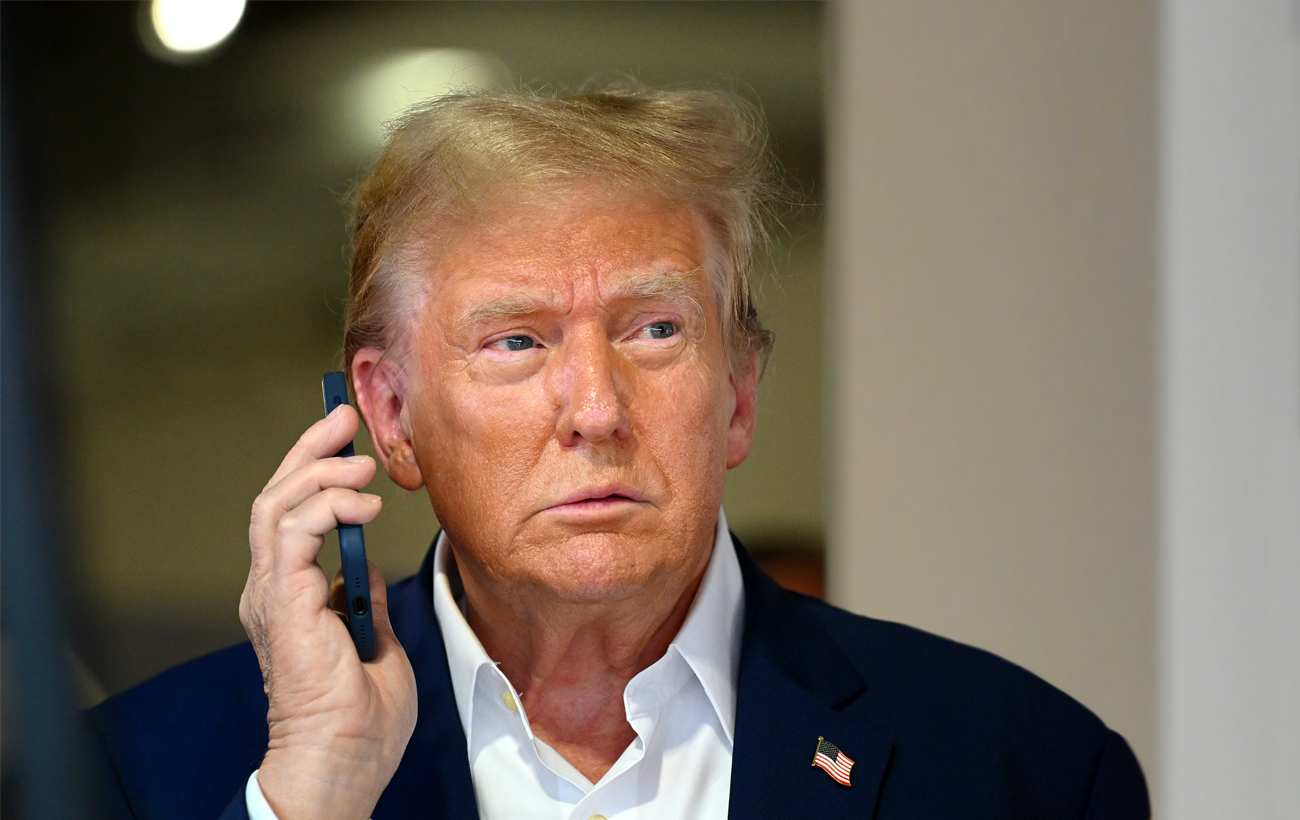
Donald Trump (photo: Getty Images)
Another plan, as reported by The Wall Street Journal, also involves Ukraine refraining from NATO membership for 20 years, but the US would continue supplying arms to Ukraine to deter further Russian attacks.
On November 9, Trump’s former senior advisor, Brian Lanza, stated that the new president’s administration would focus on achieving peace in Ukraine, albeit without the preservation of Ukraine’s territorial integrity. According to Lanza, the Trump administration will ask Kyiv for a realistic vision of peace.
"If President Zelenskyy comes to the table and says, well we can only have peace if we have Crimea, he shows to us that he's not serious," Lanza said in an interview with the BBC.
Later, a representative of Trump’s transition team told Reuters that Lanza’s comments represented only his personal opinion and that his contract had ended after the election.
Trump is still selecting his team and shaping his political positions, so statements like these should also be viewed through the lens of internal jockeying for positions.
“This is a gathering of people who are vying for or offering themselves for certain positions; they play a role in the internal power plays. That’s why they’re trying to showcase their knowledge and their potential usefulness,” said Oleksandr Leonov, executive director of the Penta Center for Applied Political Studies, in a statement to RBC-Ukraine.
Types of people Trump seeks for his team
Resolving personnel issues remains a primary focus for Trump. So far, there isn’t much confirmed news on this front. It’s known that Elise Stefanik, a member of the House Armed Services Committee and the Permanent Select Committee on Intelligence, will become the new US ambassador to the U.N. However, she has no diplomatic experience. She has been a fervent Trump supporter since his first presidency.
Two individuals known for their “hawkish” stance on foreign policy will not be joining Trump’s new team.
This includes Nikki Haley, US ambassador to the U.N. from 2017 to 2018, who was a rival in Trump’s recent intra-party race, and is thus considered a personal foe.
Mike Pompeo, Secretary of State and CIA director during Trump’s first presidency, also won’t hold any positions. Notably, Pompeo sits on the board of the Ukrainian company Kyivstar.
This means that the strongest Ukraine supporters from Trump’s previous administration won’t be part of the current one, said Volodymyr Dubovyk, director of the Center for International Studies at Odesa National University, in an interview with RBC-Ukraine.
“This time, Trump wants to surround himself exclusively with people who are absolutely loyal and will not dare to contradict him, and who, in principle, share his views. Since Trump is critical of support for Ukraine, there is no place for such people in his team. Individuals like Elon Musk, Tucker Carlson, David Sacks, and others who also doubt further support for Ukraine may carry more influence,” Dubovyk said.
Leonov agrees: “I think Trump is consciously rejecting such heavyweights who could contradict him, who might have their own opinions, etc.,” said the expert.
Among the candidates for the position of Secretary of State, a key role in foreign policy, are:
- Richard Grenell, former US ambassador to Germany and acting Director of National Intelligence;
- Marco Rubio, senator from Florida;
- William Hagerty, senator from Tennessee and former US ambassador to Japan;
- Vivek Ramaswamy, former presidential candidate and ardent Trump supporter.
Their rhetoric reflects their desire to lead the State Department. For example, Marco Rubio, who had previously leaned toward supporting Kyiv, stated after Trump’s victory that the war in Ukraine “has reached a stalemate” and needs to be halted.
Trump’s inner circle and Ukraine
In this context, Trump’s close associates play a crucial role. For instance, Elon Musk remains one of Trump’s key advisors. Notably, Musk has a very mixed stance on supporting Ukraine. On the one hand, he provided Starlink systems for Ukraine’s defense forces; on the other, he has called for ending the war without Ukraine reclaiming its territories and even blocked Starlink’s use in Ukrainian operations against Russia, which the US believed could lead to excessive escalation.
According to CNN, Musk is unlikely to take an official position on Trump’s team. Instead, he may join an informal advisory council, allowing him to maintain influence without the constraints of public office.
Another influential figure in Trump’s views is Donald Trump Jr., who has consistently opposed Ukraine. Most recently, on November 9, Trump Jr. shared a video on Instagram Stories featuring Zelenskyy and Trump, captioned: “You’re 38 days from losing your allowance.”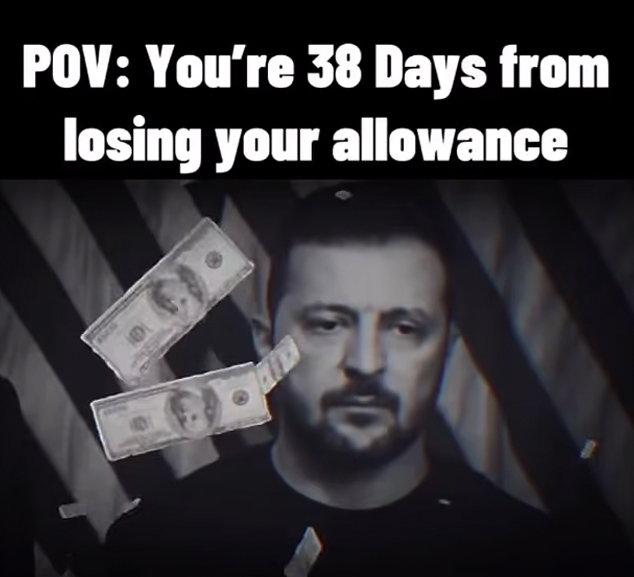
Trump Jr.'s post (photo: nstagram.com/donaldjtrumpjr/)
"Yes, Trump Jr. has long held a consistently anti-Ukrainian stance. On the other hand, his position reflects his keen understanding of his father’s sentiments. This only confirms that those who believed Trump’s anti-Ukrainian rhetoric and that of his circle was merely a campaign maneuver were mistaken. The election has come and gone, they won, yet the rhetoric remains. It reflects their worldview, the role they envision for the US, and their indifference to Ukraine’s fate in particular," said Dubovyk.
Amid the ongoing contest for positions in the Trump administration, Ukraine once again needs to underscore why even peace initiatives that appeal to Trump must align with Kyiv's interests.
"I am convinced that Trump will do everything to draft a framework before his inauguration, so that in his inaugural address he can outline a format for peace negotiations, showing he has, as promised, achieved peace. Essentially, he aims to make his term start off with a bang," said Leonov.
At this stage, Trump’s circle lacks clear Ukraine sympathizers, but also contains no overtly pro-Russian figures. Therefore, the only way to sway Trump and his circle toward Ukraine is with solid arguments — and these could come from more than just Ukraine.
On Wednesday, November 13, Trump is expected to meet with the current US leader, Joe Biden. Among other things, Biden will try to persuade his successor to maintain aid to Ukraine. This may involve not only broad statements but also specific intelligence data that Trump currently lacks access to. Nonetheless, this does not negate the need for more proactive efforts from Ukrainian diplomats and lobbyists with the incoming US administration.
Sources: BBC, The Telegraph, The Wall Street Journal, The Washington Post, CNN, and comments from Volodymyr Dubovyk, director of the Center for International Studies at Odesa National University, and Oleksandr Leonov, executive director of the Penta Center for Applied Political Studies.
